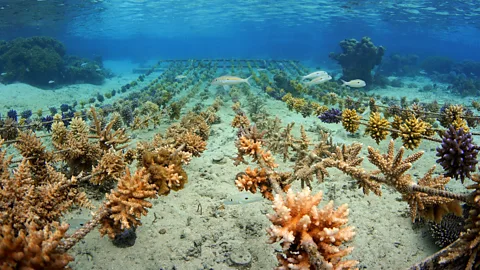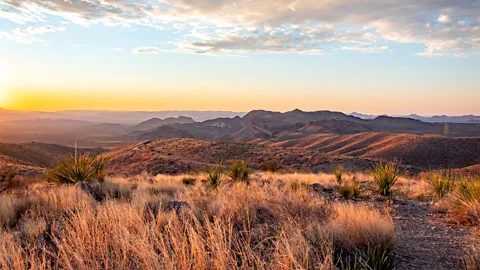5. Be curious and connect deeply
Anthony Bourdain famously said that “travel is not a reward for working, it is education for living”. It’s a great philosophy for sustainable travel – and one of the most sustainable ways to learn more about the place you are visiting is to book an Indigenous-led tour.
 Getty Images
Getty ImagesRecord demand for First Nations experiences in Australia has coincided with the launch of new tours for 2025, including a Byron Bay storytelling walk that offers a powerful way to connect with one of Australia’s most popular coastal holiday destinations. Native and First Nation tourism is also booming in North America, with the American Indian Alaska Native Tourism Association naming Oklahoma’s Chickasaw Cultural Center, which offers guided tours and a daily stomp dance demonstration, as the best cultural heritage experience for 2025.
Meanwhile, citizen science and hands-on conservation activities also allow travellers to engage with destinations on a deeper level. New for 2025, Natural Habitat Adventures’ Kenya Rhino Conservation Safari includes behind-the-scenes talks with conservationists in three leading private conservancies; while Aurora Expeditions, the world’s first major expedition cruise line to gain B Corp certification, recently added Eyesea, a platform designed to map global pollution and maritime hazards, to its robust citizen science programme.
6. Harness the apps
Calculating the carbon footprint of your travels is a great way to track your impact (try the University of California, Berkeley’s CoolClimate Calculator). But there are many other ways in which apps can help. Find new ways to immerse in nature with AllTrails, which features more than 450,000 trails across the globe including its top 25 trails to explore in 2025; and discover plant-based dining options around the world with Happy Cow, which named London as its number one vegan-friendly city for 2025. Connecting travellers with more than 800,000 drinking water sources worldwide, Droply makes it easy to avoid plastic water bottles.
And while social media has often been blamed for contributing to overtourism and other issues, research shows it can also be used as a force for good to share positive sustainable travel experiences. Did you enjoy a visit to Vilnius, the European Green Capital for 2025? Share it with your followers and inspire others to go.
 Getty Images
Getty Images7. Learn to spot greenwashing
Deceptive sustainability claims – known as greenwashing – have become increasingly prevalent in the tourism industry as businesses try to capitalise on growing demand for eco-tourism. In 2024, major airlines including Air France, Etihad, Lufthansa and Qantas were accused of making misleading sustainability claims, and Booking.com dropped its Travel Sustainable programme after regulatory backlash.
“New legislation adopted by Europe [called the Green Claims Directive] will make it much harder for companies to greenwash, and I think we will see that roll out globally,” says Becken. Until then, it’s on consumers to stay sharp. Use resources like Sustainable Travel International’s guide to avoiding greenwashing in tourism – and “don’t underestimate the value of guest reviews”, says Leventhal. “Platforms like Google offer honest insights into whether a property or tourism experience truly lives up to its promises.”
8. Leverage your privilege
Recognising the privilege to travel freely, as only a small percentage of the world’s population is able to do, is the first step in making travel a force for good. Privilege gives travellers the power to spend our travel money on experiences that are good for people and the planet, from choosing animal-friendly experiences to ensuring activities we participate in keep vulnerable children safe and don’t exploit culture or communities. It can be argued that privilege doesn’t only come with power, but also a responsibly to pay it forward.